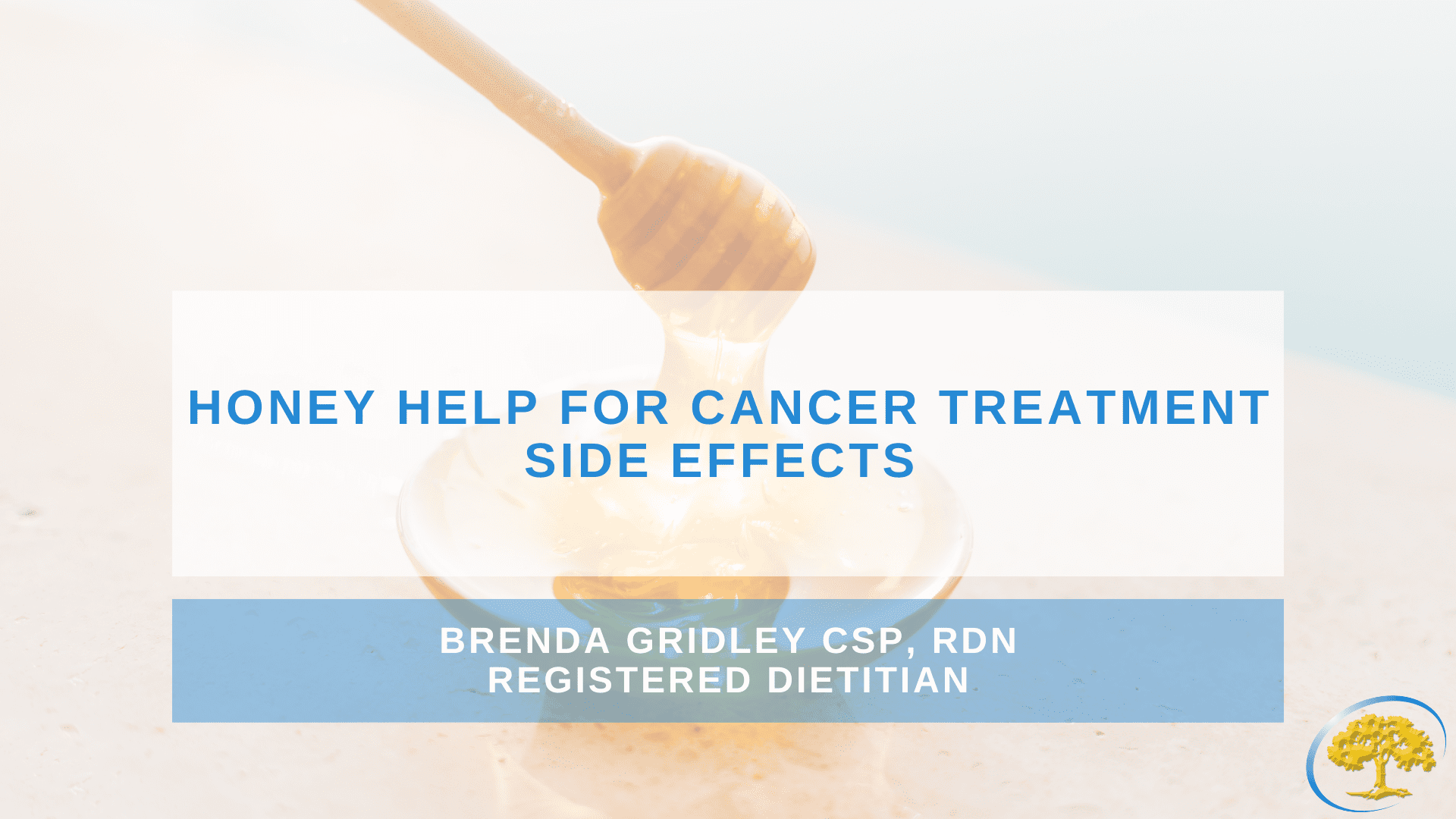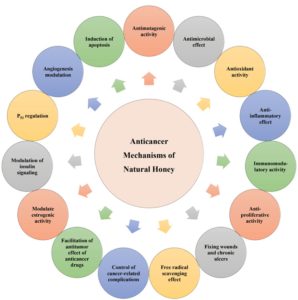
Posted 7 months ago
Honey Help for Cancer Treatment Side Effects
There are about 320 known different types of honey worldwide made from different sources of flowers. The flavor, color, and odor of each type of honey depends on the flowers and plants used by the bee to make it. Freshly extracted natural honey is a viscous liquid. Viscosity depends on many substances such as honey compounds and especially the water content. Hygroscopicity (the ability to absorb and retain ambient moisture) is another physical property of honey. The chemical composition of natural honey varies depending on the floral source used by the bee. Natural honey is composed of more than 200 different substances, including amino acids, vitamins, minerals, flavonoids (antioxidants) and enzymes.
Besides its use as a natural sweetener, honey is used as an anti-inflammatory, antioxidant, and antibacterial agent. People commonly use honey orally to treat coughs and topically to treat burns and promote wound healing. Honey has also been suggested as a promising agent for the prevention and treatment of cancer. Studies show honey and its active substances can act as anticancer compounds through various mechanisms including anti-inflammatory and antioxidant functions which can prevent the initiation, promotion, and progression of cancer. In addition, honey has shown to increase effectiveness of chemotherapy and help manage treatment side effects.
Research on honey for specific conditions includes:
– Cardiovascular disease- Antioxidants in honey might be associated with reduced risk of heart disease.
– Cough- Studies suggest that eucalyptus honey, citrus honey and Labiatae honey can act as a reliable cough suppressant for some people with upper respiratory infections and acute nighttime cough.
– Gastrointestinal disease- Evidence suggests honey might help relieve gastrointestinal tract conditions such as diarrhea associated with gastroenteritis. Honey might also be effective as part of oral rehydration therapy.
– Neurological disease- Studies suggest that honey might offer antidepressant, anticonvulsant, and anti-anxiety benefits. In some studies, honey has been shown to help prevent memory disorders.
– Wound care-Topical use of medical-grade honey has been shown to promote wound healing, particularly in burns.
– Cancer prevention and treatment of side effects- Studies suggest honey has anticancer compounds and is useful to treatment side effects.
Oral side effects remain one of the main side effects that head and neck cancer patients experience during therapy. These have a negative impact on the patient’s physical condition and gradually lead to a decreased social life and diminished overall quality of life. One of the most prominent and persistent side effects for patients with malignancy undergoing chemotherapy and/or radiation is xerostomia and mucositis.
Xerostomia is the abnormal dryness in the mouth characterized by a marked decrease and/or thickening of saliva resulting from the reduction or absence of salivary productions. Radiation can reduce the salivary flow rate by around 50% during the 1st week and up to 80% by the 7th week. These changes often result in difficulties in eating and swallowing that in turn lead to limited intake of food and liquids causing severe malnutrition and secondary infections. Acute xerostomia can cause an inflammatory reaction or delay which is associated with progressive damage on the salivary glands. It can also increase vulnerability to infections related to the teeth and mouth and some patients experience altered tastes (dysgeusia), increased thirst, and a burning/scalding sensation of the mouth (glossodynia). Xerostomia can either be temporary or permanent with direct effects on the patients’ quality of life.
Several medications and interventions are used for the treatment of xerostomia; however, there is no strong and consistent evidence to advocate in favor of a specific intervention. Recent studies have measured the effectiveness of various pharmacological and non-pharmacological measures in relieving the symptom and concluded that saliva producers, saliva substitutes and chewing gum can have varying levels of effectiveness in the management of xerostomia.
Studies have shown positive outcomes with the use of honey for management of head and neck cancer treatment side effects. The high sugar concentration draws water from the wound and therefore reduces the amount of water available to bacteria inhibiting growth. This action of honey is fortified by the presence of phytochemicals and its acidic environment with a pH ranging from 3.2 to 4.5. Furthermore, the presence of honey in the oral cavity help stimulate the salivary glands to produce more saliva.
One clinical study provided evidence on the positive effect of thyme honey on the management of radiation-induced oral mucositis and xerostomia and quality of life in head and neck cancer patients. Identical assessments at 1 month and 6 months following completion of treatment were performed in the National Cancer Institute (NCI) xerostomia scale and the Xerostomia Questionnaire (XQ) additionally to weekly oral clinical assessments.
The protocol they used – 20 ml of thyme honey 100ml of purified water – gargle 15 min before/after each radiation and 6 hrs later.
Unifloral Thyme honey is mainly produced in Italy, Greece, New Zealand, Spain and France from Thymus vulgaris. You can purchase at your local Whole Food stores and/or offline on Amazon.
Brenda Gridley, CSP, RDN

Areas Brenda has managed include pediatric and neonatal intensive care units where she was responsible for individualizing therapeutic diets and alternate nutrition support based on specific metabolic needs, medical conditions, and cultural preferences.
Her passion for nutrition was developed at a young age and reared by her grandmother who always instilled the importance of a healthy diet and active lifestyle. When her grandmother became ill, Brenda became aware of the impact nutrition plays in disease prevention and maintaining overall mind and body health.

